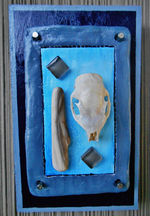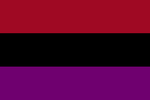Republic of Doria
This article refers to a nation which is currently in a state of inactivity. You can help make the article reflect that or ask on the talk page for further information. |
Republic of Doria | |
|---|---|
| Edmonds, Washington, United States | |
| Capital | Hyacinth |
| Official languages | English |
| Demonym(s) | Dorian |
| Government | Autocratic presidential republic |
| Establishment | 2 July 2014 |
| Population | |
• Census | 4 |
| Time zone | (UTC-8) |
The Republic of Doria or Doria is an entity which claims to be a sovereign state but is usually recognized as a micronation. Located on a residential property in Edmonds, Washington, it was founded on 2 July 2014. Doria is a presidential republic in which the head of state, the Dictator, presently holds emergency powers to legislate due to the small population.
History
Dorian Gray had been attracted to the idea of micronationalism for years, first reading about it in a magazine. King Adam of Überstadt, her coworker, encouraged her to express her political and artistic ideas through the establishment of her own nation. On 2 July 2014, Gray, at the time the sole resident of her home, established Doria, signing the constitution and declaring independence. The constitution named her Dictator of Doria, a title inspired by the dictators of the Roman Republic.
Geography
Doria consists of five non-contiguous territories, all in North America. Three are located in southwestern Snohomish County, Washington in the United States. There, the Dorian climate is a temperate marine one, often experiencing cool winds from the sound, which lies half a mile away or less. Native foliage is lacking in most of the country, however, due to urbanization.
Hyacinth
Hyacinth is the original territory claimed by the Republic of Doria. The territory covers 4,400 square feet surrounded by Edmonds in the US state of Washington. It lies on a hill overlooking Puget Sound and the Olympic Mountains from the east. The Dictatorial Residence, where the government was originally based, lies in the northern part of the territory, with a road to the United States occupying most of the remainder of the territory. Hyacinth is Doria’s number one producer of fruit, being home to two pear trees and a grape vine. The national flower, the crocus, is abundant in the southern part of the territory.
Rhododendron
Rhododendron was annexed into the Republic of Doria on March 28, 2015. The territory covers 11,761 square feet within Edmonds, WA. Rhododendron is Doria’s top producer of berries, having both raspberry and blueberry bushes.
Laburnum
The Dorian Homeland Territory, known as Laburnum, was annexed into the Republic of Doria on March 28, 2015. The territory covers one acre of land in Woodway, WA. The house in which the Dictator was born and raised is located within Laburnum. It is the greatest aspiration of the Dorian people to one day be able to purchase and take official ownership of the Homeland Territory. The most ecologically rich of the Dorian territories, Laburnum is home to indigenous wildlife including barred owls, the inspiration for the Dorian national animal. Laburnum produces large quantities of blackberries and also hosts many beautiful flowers including camellias, lilac, bluebells, rhododendron, cherry laurel, and laburnum. A small stream, known as Laurel Creek, runs through the north end of the territory.
Yucca
Yucca was annexed into the Republic of Doria on August 25, 2015. It consists of 5,000 square fee of land outside of San Felipe in Mexico. Yucca is by far the most barren and uninhabited of the Dorian territories. It has no permanent residents, and the only plant life appears to be Yucca plants. The dry bed of the stream, known as Sandy Stream, runs through the Northern portion of the territory.
Politics
Doria is a unitary presidential republic wherein the head of state and government is called the Dictator. The Constitution of the Republic of Doria, the state's founding and governing document, provides for the election of a three-person legislature, but at times of emergency or when there are fewer than thirteen citizens, the Dictator is the sole legislator. The judiciary is the Tribunal, headed by the Tribune, who is appointed by the Dictator.
Dorian politics are influenced by the rule of the Roman dictators and by the Enlightenment principles of the French Revolution. Revolutionary France is considered the single greatest influence on the government; the Declaration of the Rights of Man and the Citizen was adopted as the Dorian bill of rights, and most national holidays are connected in some way to the Revolution.
Economy
The economy of Doria is undeveloped, with low domestic production. The few exports include artwork, polished minerals, and books. Imports are primarily food and consumer products from the United States, although some fruit is imported from Überstadt.
Culture

Doria has a Western culture influenced heavily by Enlightenment philosophy and by American independent music culture. Literature and the visual arts enjoy great popularity; Dorians are all either published authors or semi-professional artists. Mixed-media sculpture is the most common and distinct form of native artistic expression. Literature usually takes the form of short fictional works, with novels produced infrequently.
Holidays in Doria are relatively frequent and are used to celebrate national values. These include such days as the birthdays of French revolutionaries and the Festival of the Supreme Being, dedicated to such values as freedom of expression, civic virtue, justice, and reason. The national day is 2 July, called Independence Day.
Dorian society is considered progressive and relatively informal. The traditional nuclear family structure is not followed and there are no significant gender-role differences. Sexual minorities are fully integrated into society and enjoy identical rights to heterosexual individuals. Public life is pursued in a fundamentally secular fashion, although there are varying degrees of private spirituality among the population.

